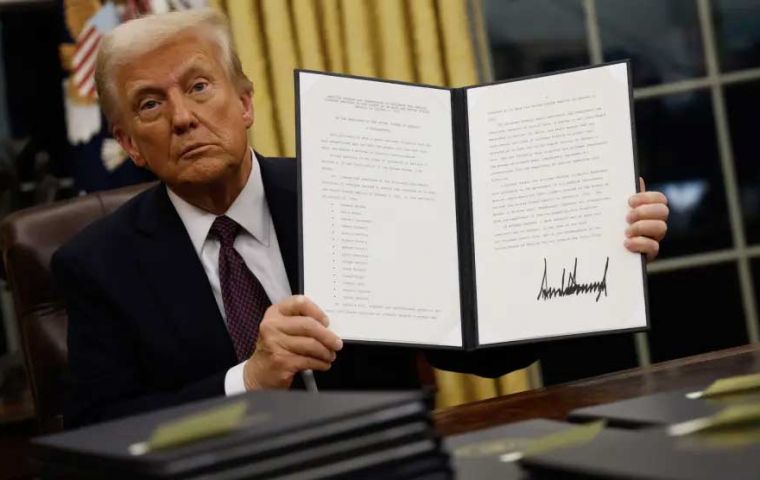MercoPress. South Atlantic News Agency
Trump signs 25% tariffs on Mexican and Canadian goods
 Trump declared a trade war between the US on one side, and China, Mexico, and Canada on the other, with the EU seemingly next in line
Trump declared a trade war between the US on one side, and China, Mexico, and Canada on the other, with the EU seemingly next in line US President Donald Trump on Saturday signed the documents imposing a 25% tariff on Mexican and most Canadian goods and a 10% tariff on Canadian energy products and Chinese goods. The target countries announced retaliatory initiatives. The reciprocal import/export taxation will become effective Feb. 4.
The measure seeks to curb illegal immigration and the flow of fentanyl into the United States, it was explained. The move is also expected to strain trade relations and a subsequent increase in prices for US residents as Mexico and Canada announced retaliatory tariffs, while China plans to file a complaint before the World Trade Organization (WTO) “and take necessary countermeasures to firmly safeguard its rights and interests.”
Citing national security concerns for declaring an economic emergency with which to protect American workers and industries from “unfair” trade practices, Trump issued the measures consisting of a 25% tariff on all imports from Mexico and most goods from Canada and 10% on Chinese goods despite fears of economic retaliation from affected countries.
The US Chamber of Commerce criticized the initiative and warned of a possible disruption in supply chains. US energy, agricultural, and consumer goods companies fear potential cost increases and loss of international competitiveness. Consumer advocacy groups forecast the tariffs would function as a tax increase for US households. Smartphones, laptops, household appliances, cars, and food products such as avocados are expected to go up as retailers warned they would pass every rise on to consumers. Trump insisted the “pain” would be worth it in the long run.
”Will there be some pain? Yes, maybe (and maybe not!)“ Trump said in a post. ”But we will Make America Great Again, and it will all be worth the price that must be paid,” he also pointed out about his efforts to reduce the country's trade deficit and bring manufacturing jobs back to the US to avoid additional costs.
The Republican leader spoke with Trudeau this weekend on the telephone to discuss potential exemptions for Canada, although no assurances were given.
Following the announcement, global stock markets fell sharply as investors feared a broader economic impact from this trade war. The Dow Jones plummeted, while European and Asian markets were also affected. In addition, companies that rely heavily on imported inputs from Mexico and China said they would have to cut jobs or move production elsewhere. While tariffs may offer temporary protection, they could weaken the broader economy in the long run, they argued.
In this scenario, the Mexican peso, the Chinese yuan, and the Canadian dollar weakened against the US currency as did cryptocurrencies, Bitcoin falling 4.4% and Ether 15%.
Trump also suggested Sunday he would not immediately impose tariffs on Britain, while the European Union (EU) would be next in line.
The President's initiative also reached a trade exemption dating back to the 1930s known as “de minimis” which allows exporters to ship packages worth less than US$ 800 into the United States duty-free. The de minimis provision has helped Chinese e-commerce companies undercut competitors, it was explained. In addition, de minimis shipments are “subject to minimal documentation and inspection,” raising product safety concerns.




Top Comments
Disclaimer & comment rules-

Read all commentsAmerica is coming for us all. :(
Feb 03rd, 2025 - 03:44 pm 0Commenting for this story is now closed.
If you have a Facebook account, become a fan and comment on our Facebook Page!